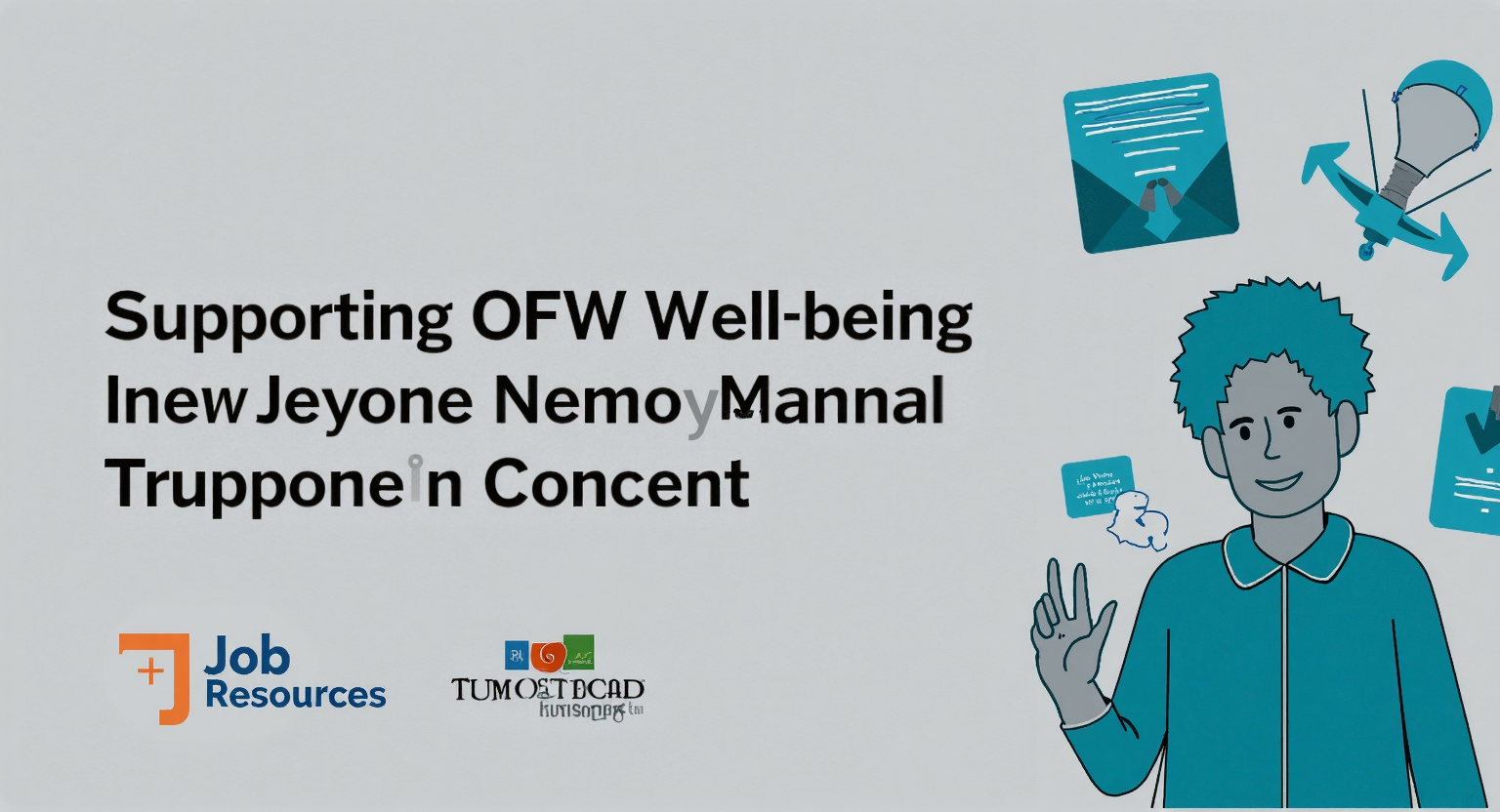Supporting OFW Well-being: A Guide to Mental Health & Job Resources Abroad
Navigating the Overseas Journey: Mental Health and Well-being Resources for OFWs
The Philippines has long been recognized as a nation of overseas workers. Millions of Filipinos leave their homes and families each year, seeking better job opportunities and a brighter future abroad. These Overseas Filipino Workers (OFWs) contribute significantly to the Philippine economy, sending billions of dollars in remittances that fuel national development and support countless families. However, the journey of an OFW is often fraught with challenges, impacting not only their physical health but also their mental and emotional well-being. This article delves into the complexities of the OFW experience, exploring the lure of job opportunities abroad, the unique challenges they face, and the crucial mental health and well-being resources available to support them throughout their journey.
The Allure of Overseas Opportunities:
The primary driving force behind the massive OFW population is the stark contrast between job opportunities and wages in the Philippines compared to those offered abroad. Many OFWs come from economically disadvantaged backgrounds, facing limited job prospects and low wages in their home country. Developed nations, particularly in the Middle East, North America, Europe, and East Asia, offer significantly higher salaries for both skilled and unskilled labor, providing a powerful incentive for Filipinos to seek employment overseas. These higher wages allow OFWs to provide for their families back home, often funding education, housing, healthcare, and even small businesses. The promise of a better life for their loved ones is a strong motivator, often outweighing the emotional and social costs of leaving their home country.
The Labyrinth of Challenges:
While the financial rewards can be substantial, the OFW experience is rarely without its challenges. These challenges can be broadly categorized into several key areas:
- Homesickness and Social Isolation: Leaving behind family, friends, and familiar surroundings can lead to intense feelings of homesickness and loneliness. The absence of a strong support network in a foreign land can exacerbate these feelings, especially during times of stress or difficulty. Cultural differences and language barriers can further isolate OFWs, making it challenging to form new connections and integrate into the host country’s society.
- Workplace Exploitation and Abuse: Sadly, many OFWs are vulnerable to exploitation and abuse in the workplace. This can include unfair labor practices, such as long working hours, low wages (despite being higher than in the Philippines, they may still be below the host country’s standards), and denial of benefits. Some OFWs face verbal, emotional, and even physical abuse from employers or colleagues. The fear of losing their jobs and the pressure to continue sending remittances home can prevent them from reporting such incidents.
- Cultural Adjustment and Discrimination: Adapting to a new culture can be overwhelming and stressful. Different customs, traditions, and social norms can lead to misunderstandings and culture shock. OFWs may also face discrimination based on their nationality, ethnicity, or religion, further adding to their emotional burden.
- Financial Stress and Debt: While OFWs earn more than they would in the Philippines, they often face significant financial pressures. The cost of living abroad can be high, and many OFWs incur debt to cover recruitment fees, travel expenses, and other initial costs. The pressure to continuously send money home can create a constant cycle of financial stress, leaving little room for personal savings or investments.
- Legal and Immigration Issues: Navigating the complex immigration laws and regulations of a foreign country can be daunting. Some OFWs may face difficulties obtaining or renewing work permits, or they may be subjected to unfair treatment by immigration authorities. Legal issues can create significant stress and uncertainty, jeopardizing their employment and their ability to stay in the host country.
- Impact on Family Relationships: The prolonged absence of an OFW can strain family relationships. Children may grow up without a parent present, and spouses may struggle with the emotional and practical challenges of single parenthood. Communication difficulties, differing expectations, and the emotional distance created by physical separation can all contribute to marital and familial discord.
Mental Health and Well-being Resources for OFWs:
Recognizing the unique challenges faced by OFWs, various organizations and government agencies have developed resources to support their mental health and well-being. These resources include:
- Pre-Departure Orientation Seminars (PDOS): Mandatory for all departing OFWs, PDOS provides essential information about the destination country, including cultural norms, labor laws, and available support services. Increasingly, these seminars are incorporating modules on mental health awareness and coping strategies.
- Overseas Workers Welfare Administration (OWWA): A government agency dedicated to protecting and promoting the welfare of OFWs, OWWA offers a range of programs and services, including repatriation assistance, financial aid, scholarships for dependents, and access to mental health professionals.
- Philippine Embassies and Consulates: These diplomatic missions provide crucial support to OFWs in their respective host countries. They offer assistance with legal and immigration issues, repatriation, and access to local support services, including mental health resources.
- Non-Government Organizations (NGOs): Several NGOs are dedicated to supporting OFWs and their families. They provide various services, including counseling, legal assistance, skills training, and advocacy for improved working conditions.
- Online Platforms and Support Groups: The internet has become a valuable resource for OFWs seeking support and connection. Online platforms and social media groups provide a space for OFWs to share their experiences, connect with others facing similar challenges, and access information about available resources.
- Mental Health Hotlines and Telecounseling Services: Several organizations offer confidential mental health hotlines and telecounseling services specifically for OFWs. These services provide a safe and accessible way for OFWs to seek professional support without fear of stigma or judgment.
- Mental Health Apps and Online Resources: A growing number of mental health apps and online resources provide tools and strategies for managing stress, anxiety, and depression. These resources can be particularly helpful for OFWs who may have limited access to traditional mental health services.
Strengthening Support Systems and Promoting Mental Wellness:
Moving forward, it is crucial to further strengthen support systems for OFWs and prioritize their mental health and well-being. This requires a multi-faceted approach involving government agencies, NGOs, employers, and the OFWs themselves. Key areas of focus should include:
- Enhanced Mental Health Training for OFWs: Pre-departure orientations should incorporate comprehensive mental health education, equipping OFWs with coping strategies and information about available resources.
- Increased Accessibility to Mental Health Services: Expanding the availability of mental health professionals trained to address the unique needs of OFWs is essential. This includes providing language-appropriate services and culturally sensitive counseling.
- Strengthening Labor Laws and Enforcement: Protecting OFWs from exploitation and abuse requires robust labor laws and effective enforcement mechanisms. Governments in both sending and receiving countries must work together to ensure fair working conditions and protect the rights of migrant workers.
- Promoting Social Integration and Cultural Sensitivity: Host countries should implement programs to promote social integration and cultural sensitivity, fostering a welcoming environment for OFWs and reducing the risk of discrimination.
- Empowering Families and Communities: Supporting the families of OFWs is crucial. Providing access to counseling, financial assistance, and other resources can help families cope with the challenges of separation and maintain strong relationships.
- Reducing Stigma and Promoting Help-Seeking Behavior: Stigma surrounding mental health remains a significant barrier to seeking help. Public awareness campaigns and education programs can help destigmatize mental illness and encourage OFWs to seek support when needed.
The journey of an OFW is a testament to their resilience, hard work, and dedication to their families. By recognizing the challenges they face and providing comprehensive support for their mental health and well-being, we can ensure that their sacrifices are met with the care and respect they deserve. Investing in the well-being of OFWs is not only a moral imperative but also a strategic investment in the future of the Philippines, as these individuals continue to play a vital role in the nation’s economic and social development.


